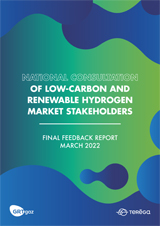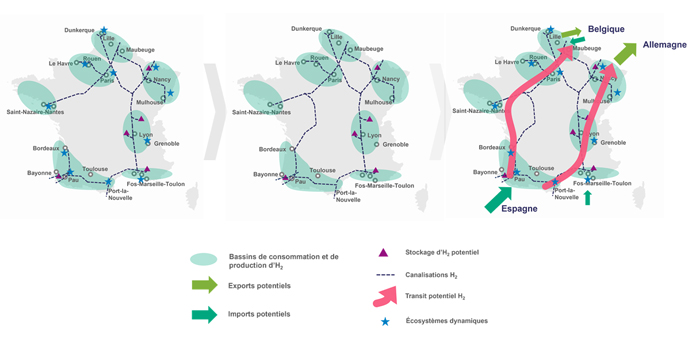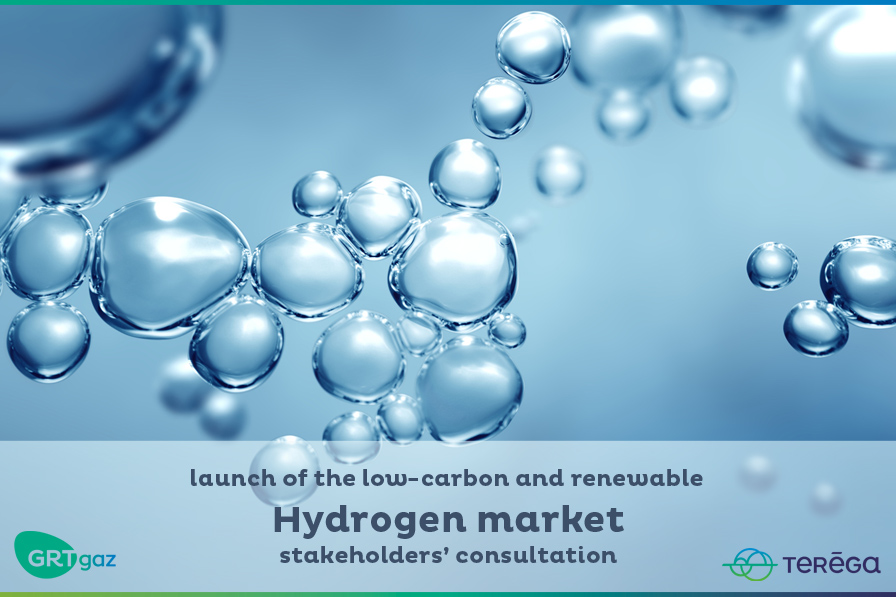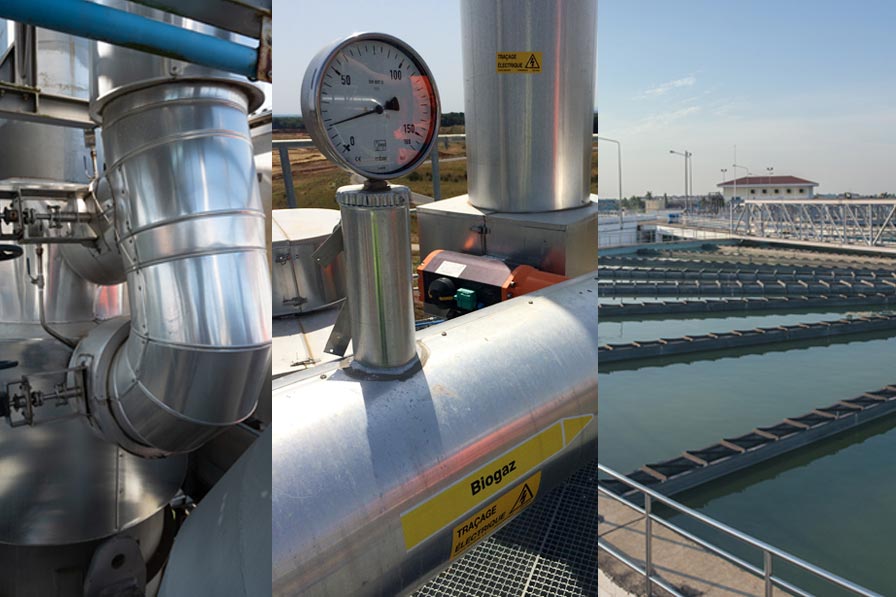Low-carbon and renewable hydrogen market stakeholders’ consultation

Addressed to all hydrogen market stakeholders – industrial companies, suppliers, producers, energy shippers, public and institutional stakeholders, non-profit organisations, infrastructure operators and academic experts – this initial consultation shows that a large majority of stakeholders stress the importance of logistics in meeting their challenges relating to security, flexibility and competitiveness.
A logistics design highlighting plans for a network that is connected to storage facilities, if necessary, has even emerged during the regional workshops. This is seen as the most effective way of bringing together potential supply and demand.
On 1 June 2021, GRTgaz and Teréga launched a national consultation with market stakeholders to find out their visions for developing a hydrogen market; their needs in terms of hydrogen transport and decarbonisation; and their expectations of gas carriers. All 133 consultation responses, 70 bilateral exchanges and 3 regional workshops confirm stakeholders’ interest in this initiative, the main elements of which are set out in a report:
Final feedback report

National consultation of low-carbon and renewable hydrogen market stakeholders
The consultation confirms stakeholders’ significant need for hydrogen in the decarbonisation of their uses, mainly for industry and mobility.
Short- and medium-term demand for hydrogen will be driven by “greening” the hydrogen currently used in industrial processes and new industrial uses. More than 80% of industrial contributors to the consultation include hydrogen in their decarbonisation strategies, alongside solutions for carbon capture, storage and recovery. In the medium term, hydrogen is also planned for use in heavy mobility. The decarbonisation of the aviation sector appears to be a driver for market growth between 2040-2050, with a huge need for hydrogen as a fuel.
Regarding supply, the potential production volumes in the responses are in line with the French hydrogen strategy's targets for 2030, and could meet the needs identified by contributors up to 2040.
There is clear agreement among stakeholders about the need for a hydrogen market that is developed as part of dynamic local ecosystems.
The consultation revealed or specified seven areas that link production and consumption projects for industrial and mobility needs, in particular in the Grand-Est basin around the Moselle industrial platforms in Carling along the Rhine, where several production and consumption projects have been announced, or even in the Greater South-West region.
In the medium term, stakeholders anticipate a regional network structured within the basins that links the different ecosystems and any storage facilities. In the longer term, there is general agreement about a national network connecting the basins, which is interconnected at the European level and which integrates storage facilities.
The consultation shows imbalances between potential production and consumption for different timeframes and geographical areas. Hydrogen logistics needs are hence justified in the short, medium and long term to reduce these imbalances.
Logistics needs are also highlighted by stakeholders reiterating the importance of having – and soon – a transport and storage system that gives them access to a diversified, competitive and secure hydrogen supply.
The consultation also highlighted the fact that matching hydrogen supply and demand via a collective approach to infrastructure planning and sizing was a key accelerator for the emergence of these ecosystems.
The regional workshops held in Dunkirk, Fos-Marseille and Pau were likewise an opportunity to outline the implementation of such an approach. The majority of contributors recognise that gas carriers have undeniable expertise in this area, and encourage them to pursue this work further. To provide stakeholders with the best possible support, GRTgaz and Teréga have therefore made short-term plans to implement the planning exercises started in the regional workshops, and to launch similar initiatives for two or three other ecosystems identified through this consultation.
Some industrial contributors also anticipate the capture, storage or recovery of CO2 (CCUS) being part of their decarbonisation strategy. They point to the fact that they need visibility for the related CO2 logistics. Given their proximity to geological storage areas, some ecosystems are conducive both to the rollout of hydrogen as an energy vector and the deployment of CCUS solutions.
The overall exercise is meant to be repeated. The aim is to regularly identify logistics needs that may be subject to change, and to specify, in addition to local planning work, the infrastructures that can support a hydrogen market that is efficient over the long term.
Hydrogen rollout

1 The description of the major hydrogen ecosystems identified is in chapter 4 of the information report
Thierry Trouvé, CEO of GRTgaz, stresses that:
“In light of feedback from local hydrogen market stakeholders as part of this consultation, GRTgaz has begun preparations for a future H2 network. This initiative can be seen in several real-world examples, particularly within the Fos-Marseille basin where, in partnership with local stakeholders, GRTgaz recently launched the feasibility study for a shared hydrogen transmission network between Fos-sur-Mer and Manosque. Other projects are emerging, such as MosaHYc in eastern France, for which GRTgaz plans for convert 70 km of existing pipeline for the transport of hydrogen.”
Dominique Mockly, President and CEO of Teréga, emphasises:
“This consultation reveals that infrastructures will allow us to streamline the hydrogen market while meeting challenges linked to balancing and the security of supply. This initial consultation has been very instructive, in particular regarding hydrogen’s role as a key decarbonisation vector for many stakeholders. As a transmission and storage network operator fully committed to the energy transition, Teréga intends to speed up the progress of its projects – for example, Lacq Hydrogen, which aims to convert part of the gas network to transport decarbonised hydrogen between France and Spain – and to support the hydrogen market in its structuring and expansion.”

